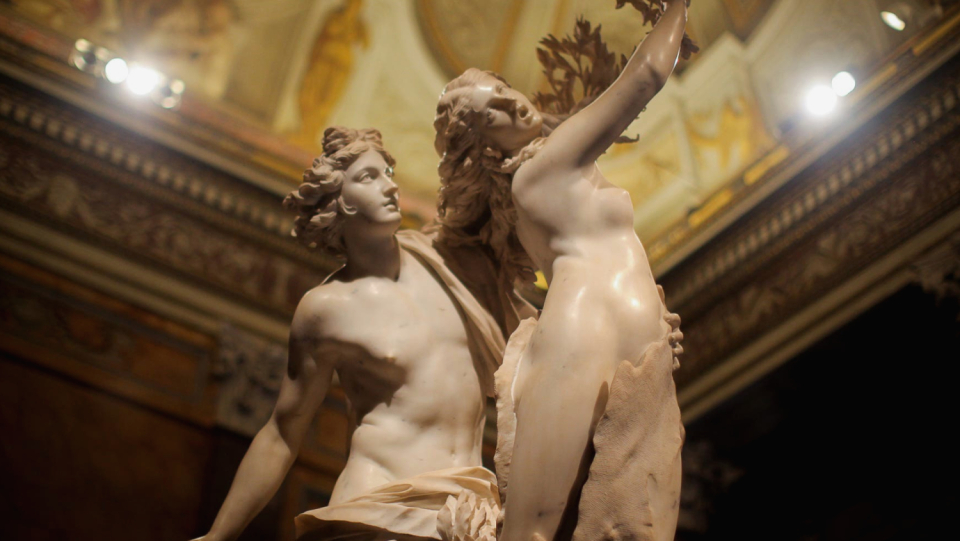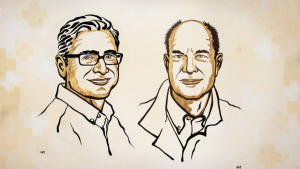A poor dog, this tibull. Springed in unfulfilled longing. Demanded by lovesickness. Creeping in the dust in front of the adored. And yet without a view to be heard. "I'm in chains," the poet from the 1st century BC. Chr., "And never, Amor solves her shackles again." The love of love burns him in the innermost. It hurts: "Take the torches away, you cruel girl."
Elegy is a sad genre from a male point of view. The goal of desire unattainable, an ice-cold, a hard mistress – »domina dura«. The desirer helpless, on the verge of madness. The Roman elegiacs Tibullus, Ovid, Propertius are traditionally regarded as luminaries of empathy. "Empathy with the woman's soul" and "effort to understand the partner" attest in particular to the youngest among them, Ovid (43 BC – ca. 17 AD), the emeritus classical philologist Michael von Albrecht. A reading that goes decidedly against the grain of his Kiel colleague Katharina Wesselmann. "I've always been a bit excited about that," says the Professor of Didactics of Ancient Languages at Christian-Albrechts-University.
Ancient poets as a forerunner of the "Incels"?
Instead of empathy, Wesselmann sees women's hatred in the robe of male self -pity and the elegant poets of antiquity as the forerunner of a very contemporary movement of frustrated young men, who come together under the collective term "incels" in virtual space because they through dismissive women, "hard mistresses", To feel their supposed right to sex. There have been "incels" - "Involuntary Celibates", involuntarily abstinent - who say their revenge fantasies in bloody violent excesses.
Is the drastic comparison accurate? Can't elegies be read differently? As harbingers of medieval minstrel poetry, for example, possibly also as literary testimonies that power between men and women is perhaps not as clearly distributed as it might seem in a feminist worldview? Wesselmann disagrees: the elegiac poet is also "the defining voice" in his work. He describes reality "as he sees it". Although woman is imagined as superior and powerful, she is in fact a passive object of desire.
Moreover, a closer look shows that the elegiac poet does not shy away from threats of violence, even the use of force. "You must die with me. Both of our blood will drip from this iron, " says Properz to a vainly courted prospect. And Ovid presents himself as a penitent violent offender: "Put my hands in shackles, they deserve chains, " he freaks out, at the same time claiming loss of control: "Frenzy has raised its impetuous arms against the mistress, and my girl is crying, hurt by an insane hand" – to this day a not uncommon argument of beating men.
After all, Tibull warns not to exaggerate it with violence: "It should be enough to tear the tender robe from her limbs, enough to mess up the order of the hair, get enough to cry." In the "ars amatoria", Finally, the "love art" of the Ovid we find a familiar questionable image of women: "You may call it violence, this violence is welcome to the girls." Women who seem to refuse in truth mean the opposite: "That you continue toend; continue, and soon your wish will be fulfilled. ”So it means yes, and always?
A case for "MeToo" using the great world literature of antiquity
Here, however, the contemporary of the Emperor Augustus (he ruled from 27 BC to 14 AD) comes close to a debate of the recent present, which has been causing a sensation under the hashtag "MeToo" since autumn 2017. Generations of old-school educated people would not have seen him there in a dream. The father of the gods Zeus, controlled by his sexual instinct, mates Leda in the form of a swan, searches for the beautiful Phoenician Europa in the form of a bull and bursts in on Danaë as a rain of gold. All this was recognized as entertaining and great world literature. But what if we ask ourselves how, from the point of view of the women concerned, the god-making could have been different? Are we possibly dealing with criminal behavior that is punishable according to the modern understanding of law, abusive behavior, attacks on sexual self-determination?
Wesselmann has led her philological existence in two years, researched at the University of Basel and at the same time taught at the high school on Münsterplatz and a Latin secondary school in Basel and Greek. Presenting the old texts interesting and attractive to a young audience is the business of the specialist didactician. What do the ancient texts have to tell us from a metoo point of view? After that, Wesselmann asked the works she has dealt with in class so far. She found it effortlessly.
Thus, in three of the six plays left to us by the Roman comedy poet Terence (around 195/184–159 BC), rapes occur which, according to Wesselmann, "function as funny, retarding and complicating plot elements", i.e. are not problematized in any way. In the Metamorphoses, the »transformations« of Ovid, a collection of mythical material connected by the common motif that in the course of the narrative one or more persons involved change their shape, there are over 50 cases of attempted or successful rape.
There is the fate of the nymph Daphne, on whom Apollo turned a blind eye. She tries to evade the intrusions of the god and flees, after Apollo, until Daphne finally begs her father, the river god Peneus, for help in extreme need. This one turns her into a laurel tree. There is the case of the nymph Io, whom the head of the gods Zeus-Jupiter first rapes and then lets take the form of a cow in order to deprive her of the curiosity of his jealous wife Hera-Juno. Io desperately tries to make herself understood, but only produces a mooing. Finally, the brutal rape of Philomela by her brother-in-law Tereus: when she threatens to make the crime known, he cuts out her tongue. In all three episodes, Wesselmann sees metaphors for the "forced silence" of women who experience violence.
The impulse to look at the old texts from the aspect of women's rights first came from the USA. As early as 2004, the literary scholar Madeleine Kahn reported on an Ovid lecture course on a college in California: the circle of participants in the accusation had suddenly become loud that the metamorphoses were a "rape manual". At the end of the discussion, however, the realization also stated that one -dimensional interpretation as a women's hostile would not do justice to the complexity of the text.
In September 2019, Wesselmann himself co-designed a teaching unit on the topic of sexual violence in the Metamorphoses at the traditional Kiel School of Learning, in which opinions differed in particular on the evaluation of the Daphne episode. About half of the class thought that the story had ended "well," namely with a "compromise": Daphne had lost her human form, but Apollo had not gotten his way either.
In German intellectual history, there has been a "tyranny of Greece over Germany" due to the obsession with antiquity.
Wesselmann has published essays about "sex and power in antiquity" since 2019 and finally a book whose title "The separated tongue" refers to the Philomela Tereus episode. The fact that the topic has achieved the German ancient sciences relatively late can also be explained with an educational tradition that is specific here on land. In the 18th century, Johann Joachim Winckelmann, director of the Antique Administration of the Church State in Rome, was in the 18th century. Especially in the art of ancient Greece, he saw "a noble simplicity and a silent size". He shaped the perception of many future generations.
In the 19th century, the linguist, diplomat and Prussian university reformer Wilhelm von Humboldt propagated the study of Greek antiquity as the key to any knowledge of the world and self. In 1935, the British Germanist Eliza Marian Butler diagnosed nothing less than a »tyranny of Greece over Germany«. In her book of the same name, she described the tradition of antiquity enthusiasm in German intellectual history since Winckelmann.
Antiquity as the epitome of the good, true, beautiful: according to Wesselmann, this idealized image "also harmed the perception of ancient languages". The ancient texts contain "the awfulness of the world in all its diversity". Under the neoclassical film, they seemed rather bland and sterile. "A wrong product is being sold there," says the didactician, who, of course, admits that she is also "obsessed with the narrative" in her choice of studies, "antiquity is the ideal, wonderful world". In this respect, turning to a more conflict-oriented reading is also a kind of demythologization of one's own educational course.
To do this, Wesselmann from Berlin's old philologist Melanie Möller had to be held up to "open up" with a didactic intention in ancient literature ". The colleague complains about the moralizing undertone, according to her impression and is insufficiently observed the "dividing line between art and life" in literary works. "I not only made myself popular with the book, but I didn't think about the experts when writing," says Wesselmann: "I had my students in my head." It is about evidence that "innovative approaches (...) Not only do not only devalue the ancient texts, but make it particularly interesting in today's world «. So the conclusion of their publication on the Ovid reading with Kiel high school students.



















